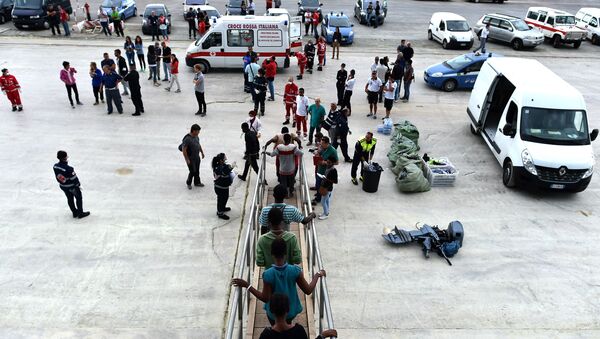Sputnik: Italy and Malta have refused to accept the migrants from the Aquarius ship. Can you tell us who exactly, under the existing law, is responsible for this ship?
Riccardo Cascioli: That's the question. Usually the law considers that you have to take the immigrants, the people in danger to a harbor near it. And so Malta has the obligation to accept them; they refused them because they said that they have no facilities for this, but that's the question now that comes up because all the other European ports in the Mediterranean have practically closed their harbors, their ports. So, only Italy until now has accepted migrants, but now the situation has changed. So, this decision of the Italian government is also a way to provoke a reaction from the European Union, so that they should intervene to oblige Malta to take immigrants if they want to continue to close their eyes on this trafficking led by NGOs [non-governmental organizations] in the Mediterranean, or otherwise the European Union should intervene and say: "No, that's enough; we can't allow this human trafficking from Northern Africa to Europe."
READ MORE: Italy Denies Entry to Another Migrant Rescue Ship — Interior Minister
Sputnik: Currently, under the law, you said that migrants must apply for refugee status in the country they first arrive to. By allowing the ship to enter the port, Malta would in fact have to accept these migrants to process them as refugees or asylum seekers, is that correct?
Riccardo Cascioli: Yes, that's correct. The question is that now we have a circulation of migrants in the Mediterranean. That's absolutely unbearable for any country. The real thing is to stop this trafficking, because no single country can really face the situation. And so this position of the Italian government is very important to try to make the European Union's policy change, to open the eyes on what is happening.
READ MORE: Malta Refuses to Accept Vessel With Over 600 Migrants After Italy's Rejection
Sputnik: It turns out that any country that has a port is a subject to this kind of migration stress, whereas the countries that are landlocked don't have this problem whatsoever, I mean if people are coming over, they are coming over in planes and that's probable a different level or that's not the same kind of trafficking victims and it's a little bit different level of education, probably, and financial capabilities of those migrants who do come over in the plane, isn't that correct?
Riccardo Cascioli: Yes, I think about this phenomenon. There is also a misunderstanding: We are not talking about immigration in general, we are talking about irregular immigrants. So, in a way this is a question of emergency, but this emergency is going on for years and years. The emergency has become the normality. But they are irregular, this is the question. Out of hundreds of thousands of irregular immigrants that have arrived in Italy, for example, only 5 percent, more or less, of them had in these years the right to be recognized as refugees. So, in the end, Italy, like any other European country, should have the duty to accept only these refugees and not all the other irregular immigrants.
READ MORE: Will New Italian Government Succeed in Solving 'Migrant Problem'?
So, this is a very clear, circumspect phenomenon. It's not about immigration in general; it seems that we are racists who refused. It's just a question of respecting the international law. There is a difference between economic migrants and political or war refugees. These are completely different things. So what's happening now is just a real human trafficking led by international criminal organizations. They are partners in this crime with some NGOs, they call them humanitarian and they show themselves as going to save people but the problem is that in the Mediterranean they are allowed to leave Northern Africa's coasts. That shouldn't happen.
The views and opinions expressed by Riccardo Cascioli are those of the speaker and do not necessarily reflect those of Sputnik.


